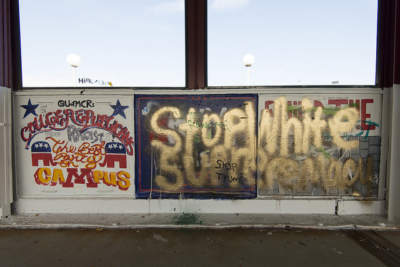The media has shown us months of outraged reactions over Donald Trump’s election, particularly among students. Campus protests frequently appear on our TV screens and in our newspapers. But, few are talking about students who walk past the rallies that protest the result of their vote – or their presumed vote as Republicans. Few are talking about Republican students in a way that doesn’t simply frame them as the actual or supposed targets of a newly fired-up leftist majority. The Jewish community is no exception.
Jewish students who identify as Republican have faced some backlash from their peers. “I am very outnumbered as most Jewish campus groups are extremely left-leaning…” said College of William and Mary sophomore Drew Liquerman. He said he felt relieved to be studying abroad in Scotland now, where right-wing groups like Republicans Overseas thrive.
“… Sadly, sometimes I find Jewish groups to be some of the least tolerant towards right-leaning groups, even though they are clearly the most pro-Israel and most Zionist on campus,” Liquerman added.
Other Jewish Republicans on campus can attest to an unfriendly campus atmosphere. Steven Aranyi, who graduated from Indiana University last December, said liberal Jewish students treated him differently, even though he also wants to “hold Trump accountable to issues pertaining to the Jewish community, Israel, anti-Semitism in America, etc.”
“Some more hostile members of the community have consistently attempted to make a mockery of me in public or on social media in an attempt to prove to me that I’m wrong about some of my conservative views,” Aranyi said. “I do not give them a platform, because I do not care what others think, and I am focused on winning.”
But others haven’t felt particularly alienated on campus. “I don’t feel outnumbered,” said George Washington University freshman Shep Gerszberg. “I have my group of friends. Some are Republican, some are Democrat. But they became my friends because I know that I can talk to them about anything, even politics, and every opinion that both of us have will be respected.”
Some students, like Aaron Wildavsky, left the Republican Party because of the Trump presidency and feel very much a part of student opposition to the current administration. “I don’t really feel outnumbered, because I’m pretty much on the masses’ side, so to speak, when it comes to being anti-Trump in Jewish communities,” he said.
However, being part of the opposition has not made Wildavsky immune from criticism. He does feel “a little insecure about my role within the Jewish community in the age of Trump,” he said, because he doesn’t consider himself an activist type.
“I have a very moderate, conflict-averse personality,” he said. “Even when my immediate reaction to something Trump does is one of disgust, I usually find myself second-guessing my position somewhat, to the point where it’s hard for me to get riled up enough to go out and protest. So, I worry about being pigeonholed as complacent or an apologist for Trump on account of my failure to work actively against him.”
“And to a certain extent, I even buy into this hypothetical criticism myself. I feel like I sometimes am too complacent,” he added.
Altogether, these students called for the Jewish community to show tolerance despite political differences and expressed hope that coexistence on campus is possible.
Wildavsky noted that campus Jewish communities need to avoid demonizing Trump supporters, “even if you think Trump is abhorrent and those who voted for him did a terrible thing. Many of them did have good intentions, and while people do have to be accountable for the impact of their actions, intentions can’t be written off entirely,” he said.
With mutual respect, “all divisions can be healed,” Gerszberg said. “What people on both sides have to recognize is that neither side has malicious intent. Neither side wants to hurt people just for the sake of hurting people. Both sides just want what is best for the country. They just have different ways of getting there. Once we accept that, the vitriol and hate should automatically go away.”
He stressed that this doesn’t mean shutting down debate. “We can argue policy – we should argue policy – but at the end of the day, if we accept each other, not only will we be a better community, but we will also be in a better place to compromise and come up with solutions for both sides to help move our country and Jewish community forward,” he said.
Aranyi agreed that, with proper debate, the Jewish community can ultimately overcome polarization on and off campus. “The Jewish community is a tolerant community – and I think that, with discourse, the Jewish community can come together as one,” he said.
Jewish Republicans on campus are ultimately diverse. Some voted for Trump, while others join with liberals in opposition to his policies. Nonetheless, their message to the Jewish campus community is the same: Campus Jews – and the Jewish community at large – can make respectful, bi-partisan kvetching great again.
Jackson Richman is a senior studying political science at George Washington University. He has interned at The Weekly Standard and The Daily Caller. He’s a frequent contributor for Red Alert Politics and American Action News. You can follow him on Twitter: @jacksonrichman.
![29529119373_bf631f8dbb_z A graffitied College Republicans' "Build the Wall" mural at the University of Minnesota. | By Fibonacci Blue [CC BY 2.0], via Creative Commons](https://newvoices.org/wp-content/uploads/2017/03/29529119373_bf631f8dbb_z.jpg)


